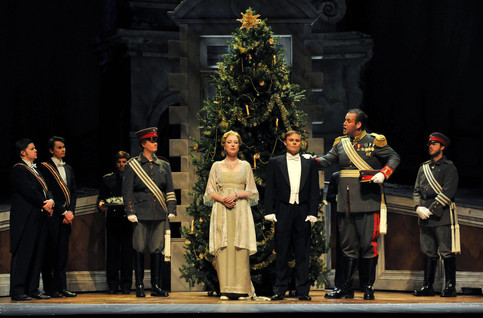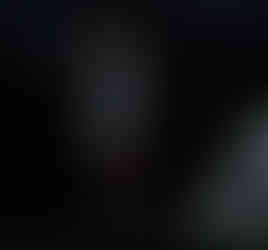FWO Archives: Kevin Puts and Mark Campbell's "Silent Night" (2014 Festival)
- Fort Worth Opera

- Sep 9, 2020
- 7 min read
Based on the multilingual screenplay for the 2005 film Joyeux Noël, this Pulitzer Prize-winning opera recounts the historic, fleeting 1914 Christmas truce between enemy combatants during World War I.

World War I and the Christmas Truce of 1914

Now approaching its centenary, World War I scarcely receives the same attention as its more atrocious and deadlier younger sibling. Yet the conflict’s position in history reveals a horrific change in modern warfare tactics that must have shocked and overwhelmed its participants. The last major clash had been between France and Prussia in 1870–1871, instigated by the former, but provoked by the latter over the succession of the Spanish crown to a Hohenzollern heir. Since the Napoleonic wars, the Germans had been engaged in a massive land-grab, acquiring Schleswig-Holstein in 1864; Hesse, Hanover and Mecklenburg in 1867; Bavaria in 1871; and the Alsace and Lorraine districts following the French defeat.

Following the Franco-Prussian War, politics on the Continent continued to sour. France, Austria and Denmark would never get over their strategic and territorial losses. Austria found some solace in assimilating the Balkan nations of Bosnia and Herzegovina, an action supported by the diplomatically sympathetic Germans, while angering the other Balkan nations, Serbia in particular. Russia had the recent unpleasant memory of losing a war in the Crimea (1853–1856) fought against Turkey, France, and Britain. Nonetheless, an eventual alliance was made between the three unlikely comrades who now feared a newly unified Germany’s menacing power. Britain, in particular, was drawn out of historical isolationism after seeing Russia’s disastrous defeat in the Russo-Japanese war in 1905, knowing France would need at least one functional ally.

Wilhelm II of Germany was terrified of the shift in balance of power, for his only treaty was with Austrian Emperor Franz Joseph, a relationship that had been tested by his grandfather in the 1866 war between the two countries. In an unexpected tactical move, when the young Kaiser inherited his empire, he foolishly dismissed the new Reich’s architect, Otto von Bismarck. Through duplicity, diplomacy and guile, the former chancellor had carefully engineered the map of Europe to Germany’s advantage. Wilhelm preferred a more direct approach and embraced the “Schlieffen Plan,” a remarkably detailed and audacious top-secret preparation to invade France through Belgium and the Alsace-Lorraine (to be fair, France had a similar Plan XVII designed to retake its conquered provinces). The army could be sustained by Germany’s vastly superior and government-controlled railway system, giving the initiative enough manpower and artillery to capture Paris in 39 days. Attention could then be shifted to the east, as it would take the third entente member, Russia, at least that long to marshal its forces, thereby avoiding a war on two fronts.

Wilhelm found his opportunity when the heir to the Austrian Empire, Franz Ferdinand, and his wife were fatally shot on June 28, 1914, in Sarajevo, Bosnia, by a member of the Serbian radical group, the Black Hand (the anarchists had already successfully murdered the king and queen of Serbia in 1903). He privately urged the archduke’s uncle, Franz Joseph, to take decisive action. When a list of unrealistic demands to investigate the matter was rejected (actually the Serbian government agreed to all but a few points), Austria recalled its ambassador and declared war within the month. The resulting conflict in the remote Balkans was hardly a concern for greater Europe, but all the treaties were triggered into action. Russia was honor-bound to defend Serbia and entered the war on its behalf. Wilhelm was obligated to fight on Austria’s side, and to justify the protection of Germany’s own borders in East Prussia, he seized the opportunity to initiate the Schlieffen Plan against Russia and its allies. On August 4, 1914, the Germans invaded Belgium and headed toward France. As this action was a violation of Belgian neutrality, Britain was obliged to enter the war, against strong opposition.

The Schlieffen Plan was largely an intellectual exercise and didn’t account for a fair amount of Belgian resistance or British involvement. Nonetheless, in a few months the Germans found themselves entrenched on the French border. A war that was supposed to be over in six weeks had stalemated by December. Part of the problem was the increased lethality of industrialized nations. In the four-decade gap since the last skirmish, both sides had significantly developed the velocity and range of artillery, which now included bolt action rifles, Howitzers, machine guns, and tanks. Cavalry, cannons, and bayonet runs were replaced by large, black, ear-splitting siege guns (christened “Black Berthas,” after the Krupp bomb manufacturing heiress) that yielded nitrate incendiary devices, capable of killing more soldiers with greater force, as did the subsequent introduction of unpredictable, toxic chlorine gas. In trenches that ran from the English Channel to Switzerland, both sides dug in their heels for a subterranean war of attrition and endured hideous conditions.

By December, Pope Benedict XV called for a cessation of hostilities for the holiday season, and both sides were ready for a break in the unanticipated carnage. Acceptable military code allowed for small armistices during the course of a war (for meals and to bury the dead), and fraternization with the enemy, though discouraged, had occurred as recently as the Crimean, Civil, and Franco-Prussian wars. “Tommy” and “Fritz” could put aside obligatory nationalism to see their opponents as regular guys forced into combat by ambitious superiors. Given Britain’s strong German ties, many soldiers had actually worked in England and spoke English. Saxons and Anglo-Saxons had a shared ancestry, and most of the other Germans were Bavarian, Hessian, and Westphalian reservists rather than soldiers of the Prussian elite – those were sent to the eastern front to defend their native lands.

Still, an official Christmas truce in 1914 was out-of-the-question, yet contrary to popular belief, there were many of them up and down the lines. The British had received care packages from King George’s daughter, Princess Mary, containing tobacco and chocolate, and the Germans were given cigars, beer, and Tannenbäume from 32-year-old Kronprinz Wilhelm (who actually commanded the Fifth Army in the Argonne). Interactions varied from singing holiday songs back-and-forth between the trenches to actual ceasefires with both sides meeting on the battlefield, sharing a smoke and exchanging rations. One had to be careful not to get too close to enemy territory, for some soldiers were taken prisoner if they gained any knowledge of positions or weaponry. Many of the British were perplexed by the appearance of the candle-lit trees over the makeshift bunkers and the kind spirits of the Germans – these were, after all, the same people who had brutally invaded Belgium with little regard for civilian life or property. Nonetheless, if they kept the conversation light and didn’t discuss the war, conviviality could be maintained.

Once part of the proud Napoleonic Grande Armée until La Débâcle (their defeat to the Prussians), the French soldiers were a little more hesitant to be cordial, given Germany’s aggressive history toward their country, with its siege and land seizure just 40 years earlier, and at present at the edge of France with the intent to recapture Paris. With the spirit of revanche, their camaraderie was not nearly on the same scale as the British. As one recorded, “You would not find the French and Germans exchanging cigarettes, I think, even if it were the morning of Judgment Day.” (In contrast, one rather ungrateful French soldier remarked to a German, “Beat those Britishers. We have no use for them.”) Though there were short agreements to lay down arms in order to take care of the dead (many of whom had been putrefying on the battlefield for weeks), after the task was completed, the animosity on both sides only grew.

Experiences varied from place to place. In some cases, wild animals were shot, roasted and shared, and football games (American soccer) allegedly took place on Christmas Day (though the shell-pitted battlefield may have presented somewhat of a challenge). Two famous opera singers were recognized singing at the front. Incidents of haircuts, juggling and backwards bicycling were reported, and newspapers were exchanged as the Germans believed theirs were filled with lies. Photos were taken and letters of disbelief were sent home detailing the unusual circumstances – several found their way into the English and German periodicals alongside reports of their adversaries’ barbarity. When hostilities did resume, it was with reluctance, and the conflict was slow to achieve its original pitch.
Naturally, when news reached headquarters of these unofficial armistices, the high command was not pleased, but retribution was relatively lax. Though anti-fraternization is key to the success of any soldier, there was still a sense of wartime chivalry and few court-marshals were conducted, only a stern warning not to do it again. Many units were redeployed as it was believed they would not fight with the same voracity now that they had met the enemy face-to-face.

In the end, the Schlieffen Plan ultimately failed. The war redrew the map of Europe, costing millions of lives and the end of three empires while laying the groundwork for an even deadlier and more grotesque conflict just two decades later. Early in the War to End All Wars, a 25-year-old lance corporal had narrowly escaped death in the first battle of Ypres on the Belgian border. He vehemently declined to participate in the Christmas Truce that followed and was devastated by Second Reich’s loss nearly four years later. Embittered, a wildly patriotic Adolf Hitler set in motion his dangerous course for an apocalyptic new world order.
Notes by David Sander, Dramaturg for Minnesota Opera
Originally printed by Minnesota Opera
Reprinted with Permission
CAST AND CREATIVE
Music by Kevin Puts
Libretto by Mark Campbell
Commissioned by Minnesota Opera
Sung in English, French, German, Italian, and Latin
Featuring the Fort Worth Symphony Orchestra
CONDUCTOR Joe lllick
STAGING DIRECTOR Octavio Cardenas*
SCENIC DESIGNER Francis O'Connor*
COSTUME DESIGNER Kӓrin Kopischke*
LIGHTING DESIGNER Marcus Dilliard
PROJECTION DESIGNER Andrezj Goulding*
ASSOCIATE PROJECTION DESIGNER Daniil Efros
SOUND DESIGNER C. Andrew Mayer*
ASSOCIATE SOUND DESIGNER RaByn Taylor
MAKEUP AND WIG DESIGNER Steven Bryant
STAGE MANAGER Lisa Marie Lange
ASSISTANT DIRECTOR Andrew Neinaber
REPETITEUR Emily Jarrell Urbanek
ENGLISH SUPERTITLE TRANSLATION Mark Campbell
SPANISH SUPERTITLE TRANSLATION Gabriela Lomónaco
The Cast in Order of Vocal Appearance
ANNA SØRENSON Ava Pine
NIKOLAUS SPRINK Chad Johnson*
FATHER PALMER Christopher Burchett*
JONATHAN DALE Kevin Newell
WILLIAM DALE Matt Moeller*+
MADELEINE AUDEBERT Clara Nieman*+
LT. AUDEBERT Morgan Smith
LT. GORDON Dan Kempson
PONCHEL Steven Eddy^
LT. HORSTMAYER Craig Irvin*
KRON PRINZ Nicholas Simpson*
BRITISH MAJOR Jesse Enderle
FRENCH GENERAL Aaron Sorensen
*Debut Season
+FWO Studio Artist
^FWO Studio Artist Alum































Comments